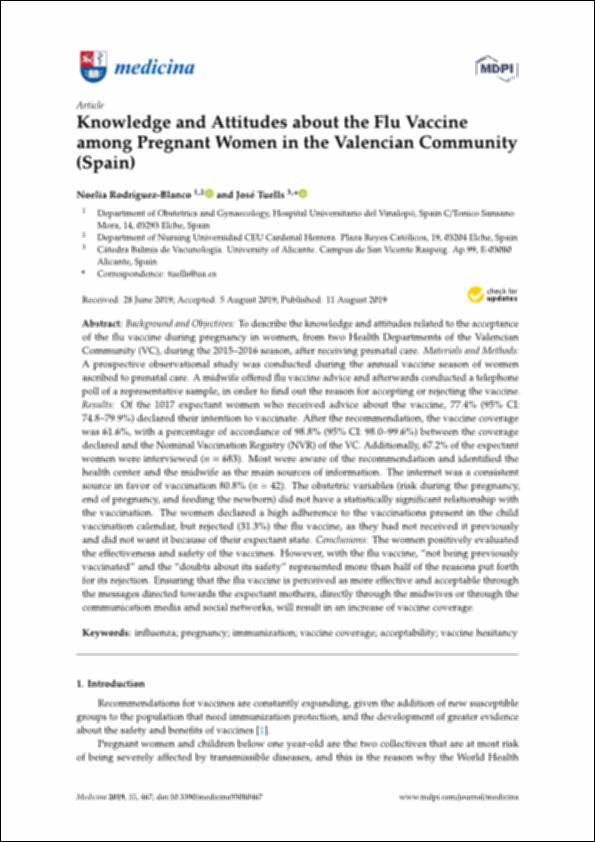Por favor, use este identificador para citar o enlazar este ítem:
http://hdl.handle.net/10637/10867Knowledge and attitudes about the flu vaccine among pregnant women in the Valencian Community (Spain).
| Título : | Knowledge and attitudes about the flu vaccine among pregnant women in the Valencian Community (Spain). |
| Autor : | Rodríguez Blanco, Noelia Tuells Hernández, José Vicente |
| Materias: | Gripe - Vacunación.; Gripe - Aspectos inmunológicos.; Pregnancy.; Influenza - Immunological aspects.; Embarazo.; Influenza - Vaccination. |
| Editorial : | MDPI : Lithuanian University of Health Sciences. |
| Citación : | Rodríguez-Blanco, N. and Tuells, J. (2019). Knowledge and attitudes about the flu vaccine among pregnant women in the Valencian Community (Spain). Medicina, vol. 55, n. 8, art. 467 (11 aug.). DOI: https://doi.org/10.3390/medicina55080467 |
| Resumen : | Background and Objectives:To describe the knowledge and attitudes related to the acceptanceof the flu vaccine during pregnancy in women, from two Health Departments of the ValencianCommunity (VC), during the 2015–2016 season, after receiving prenatal care.Materials and Methods:A prospective observational study was conducted during the annual vaccine season of womenascribed to prenatal care. A midwife offered flu vaccine advice and afterwards conducted a telephonepoll of a representative sample, in order to find out the reason for accepting or rejecting the vaccine.Results:Of the 1017 expectant women who received advice about the vaccine, 77.4% (95% CI:74.8–79.9%) declared their intention to vaccinate. After the recommendation, the vaccine coveragewas 61.6%, with a percentage of accordance of 98.8% (95% CI: 98.0–99.6%) between the coveragedeclared and the Nominal Vaccination Registry (NVR) of the VC. Additionally, 67.2% of the expectantwomen were interviewed (n=683). Most were aware of the recommendation and identified thehealth center and the midwife as the main sources of information. The internet was a consistentsource in favor of vaccination 80.8% (n=42). The obstetric variables (risk during the pregnancy,end of pregnancy, and feeding the newborn) did not have a statistically significant relationship withthe vaccination. The women declared a high adherence to the vaccinations present in the childvaccination calendar, but rejected (31.3%) the flu vaccine, as they had not received it previouslyand did not want it because of their expectant state.Conclusions:The women positively evaluatedthe effectiveness and safety of the vaccines. However, with the flu vaccine, “not being previouslyvaccinated” and the “doubts about its safety” represented more than half of the reasons put forthfor its rejection. Ensuring that the flu vaccine is perceived as more effective and acceptable throughthe messages directed towards the expectant mothers, directly through the midwives or through thecommunication media and social networks, will result in an increase of vaccine coverage. |
| Descripción : | Este es el artículo que se ha publicado de forma definitiva en: https://www.mdpi.com/1010-660X/55/8/467 Este artículo pertenece al número especial "Promoting Vaccine Acceptance". |
| URI : | http://hdl.handle.net/10637/10867 |
| Derechos: | http://creativecommons.org/licenses/by/4.0/deed.es |
| ISSN : | 1010-660X (Electrónico). |
| Fecha de publicación : | 11-ago-2019 |
| Centro : | Universidad Cardenal Herrera-CEU |
| Aparece en las colecciones: | Dpto. Enfermería y Fisioterapia |
Los ítems de DSpace están protegidos por copyright, con todos los derechos reservados, a menos que se indique lo contrario.


